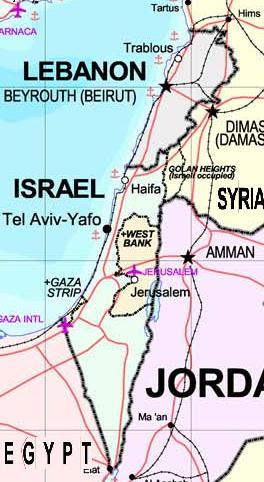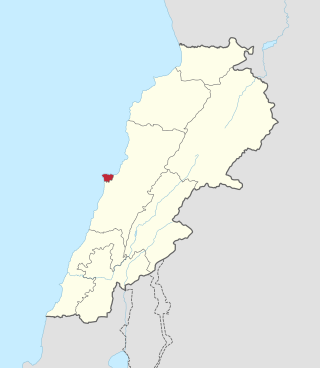This is a timeline of events related to the 2006 Lebanon War.

The Israeli–Lebanese conflict, or the South Lebanon conflict, is a series of military clashes involving Israel, Lebanon and Syria, the Palestine Liberation Organization, as well as various militias and militants acting from within Lebanon. The conflict peaked in the 1980s, during the Lebanese Civil War, and has abated since.

The History of the Israel Air Force begins in May 1948, shortly after the formation of the State of Israel. Following Israel's declaration of independence on May 14, its pre-state national institutions transformed into the agencies of a state, and on May 26, 1948, the Israeli Air Force was formed. Beginning with a small collection of light aircraft, the force soon transformed into a comprehensive fighting force. It has since participated in several wars and numerous engagements, becoming what has been described as "The mightiest air force in the Middle East".

The Iran–Israel proxy conflict, also known as the Iran–Israel proxy war or Iran–Israel Cold War, is an ongoing proxy conflict between Iran and Israel. In the Israeli–Lebanese conflict, Iran has supported Lebanese Shia militias, most notably Hezbollah. In the Israeli-Palestinian conflict, Iran has backed Palestinian groups such as Hamas. Israel has supported Iranian rebels, such as the People's Mujahedin of Iran, conducted airstrikes against Iranian allies in Syria and assassinated Iranian nuclear scientists. In 2018 Israeli forces directly attacked Iranian forces in Syria.

The May 2013 Rif Dimashq airstrikes were a series of aerial attacks made on targets in Syria on 3 and 5 May 2013. The 3 May attack was on targets at Damascus International Airport. The 5 May attacks were on targets at Jamraya, and the Al-Dimas and Maysalun areas in Rif Dimashq. Although officially Israel neither confirmed nor denied its involvement, former Mossad director Danny Yatom and former government member Tzachi Hanegbi inferred Israel's involvement in the attack. Official Syrian sources denied any attack on its soil on 3 May, but did accuse Israel for the attacks on 5 May.
The Lebanese–Syrian border clashes were a series of clashes on the Lebanon–Syria border caused by the ongoing Syrian Civil War.

The Battle of Qalamoun started on 15 November 2013, with air strikes on the town of Qara, in the strategic Qalamoun region, in an attempt by the Syrian Army to cut rebel supply lines to Damascus from Lebanon. The strategic region had been used by rebel forces as a rear base for its operations around the capital Damascus. For its part, government forces had been using the nearby highway to link Damascus with the central Homs province and had multiple weapons depots in the area. The battle was primarily led on the rebel side by the Al-Nusra Front.

The 2013 Iranian embassy bombing in Beirut was a double suicide bombing that occurred in front of the Iranian embassy in Beirut, Lebanon on 19 November 2013. The two bombings resulted in 23 deaths and injured at least 160 others.

Several incidents have taken place on the Israeli–Syrian ceasefire line during the Syrian Civil War, straining the relations between the countries. The incidents are considered a spillover of the Quneitra Governorate clashes since 2012 and later incidents between Syrian Army and the rebels, ongoing on the Syrian-controlled side of the Golan and the Golan Neutral Zone and the Hezbollah involvement in the Syrian Civil War. Through the incidents, which began in late 2012, as of mid-2014, one Israeli civilian was killed and at least 4 soldiers wounded; on the Syrian-controlled side, it is estimated that at least ten soldiers were killed, as well as two unidentified militants, who were identified near Ein Zivan on Golan Heights.

The Qalamoun offensive (2014) was launched by the Syrian Army, in coordination with the Lebanese militia Hezbollah, during the Syrian Civil War against remnant rebel forces following the previous Battle of Qalamoun which resulted in the military securing all of the towns in the region.
The following lists some remarkable events that happened in 2014 in Lebanon on a monthly basis.
Events in the year 2015 in Israel.
The January 2015 Mazraat Amal incident was an airstrike against a two-car convoy that killed six Hezbollah fighters, including two prominent commanders, and a general of the Iranian Revolutionary Guards (IRGC), Mohammad Ali Allahdadi, at al-Amal Farms in the Quneitra District of Syria, in the Eastern Golan Heights, on 18 January 2015, during the Syrian Civil War. The attack was largely attributed to Israel, which did not officially confirm that it carried it out. Hezbollah and IRGC held Israel responsible and threatened to retaliate. On 19 January 2015, Al-Nusra Front member Abu Azzam al-Idlibi claimed that Jihad Mughniyeh and the other Hezbollah fighters were killed in an Al-Nusra Front ambush at Jaroud in the Qalamoun Mountains in the Al-Qutayfah District northeast of Damascus, claiming that it "will be the end of the Persian project, God willing."

As a response to an Israeli attack against a military convoy comprising Hezbollah and Iranian officers on January 18, 2015 at Quneitra in southern Syria, the Lebanese Hezbollah group launched an ambush on January 28 against an Israeli military convoy in the Israeli-occupied Shebaa Farms, firing anti-tank missiles against two Israeli Humvees patrolling the border, destroying the two Humvees and killing 2 and wounding 7 Israeli soldiers, according to Israeli military. The number of Israeli casualties was 15 according to a report by Al Mayadeen television station. A Spanish UN peacekeeper was also killed by Israeli fire during consequent fire exchanges in the area, with Israel firing artillery and Hezbollah responding by mortar shells. The conflict ended later the same day after UNIFIL mediation.
Israel's official position on the Syrian Civil War has been strict neutrality. However, Israel has become involved politically and militarily to prevent the growing influence and entrenchment of Iranian forces and its proxies throughout Syria. Israel's military activity, officially called Operation Chess, has primarily been limited to missile and air strikes targeting Iranian facilities in Syria as well as those of its proxies, especially Hezbollah. These attacks were not officially acknowledged before 2017. Israel has also carried out air strikes in Syria to disrupt weapons shipments to Hezbollah. By August 2022, the UK investigative non-profit Airwars estimated that 17-45 civilians were killed and another 42-101 civilians were wounded by Israeli airstrikes in Syria since 2013. Syrian reports place these figures much lower than other foreign actors in the conflict. Israel has also provided humanitarian aid to victims of the civil war from 2013 to September 2018, an effort that was ramped up after June 2016 with the launch of Operation Good Neighbour.

Hezbollah involvement in the Syrian Civil War has been substantial since the beginning of armed insurgency phase of the Syrian Civil War in 2011, and evolved into active support for Ba'athist government forces and troop deployment from 2012 onwards. By 2014, Hezbollah was deployed across Syria. Hezbollah has also been very active in preventing Al-Nusra Front and Islamic State penetration into Lebanon, being one of the most active forces in the Syrian Civil War spillover in Lebanon.

The Qalamoun offensive was an offensive led by the Iranian-backed militia Hezbollah, supported by the Syrian Army, during the Syrian Civil War, against the al-Nusra Front and other Syrian opposition forces entrenched in the mountains of the Qalamoun region.
The Iran–Israel conflict during the Syrian civil war refers to the Iranian–Israeli standoff in and around Syria during the Syrian conflict. With increasing Iranian involvement in Syria from 2011 onwards, the conflict shifted from a proxy war into a direct confrontation by early 2018.








